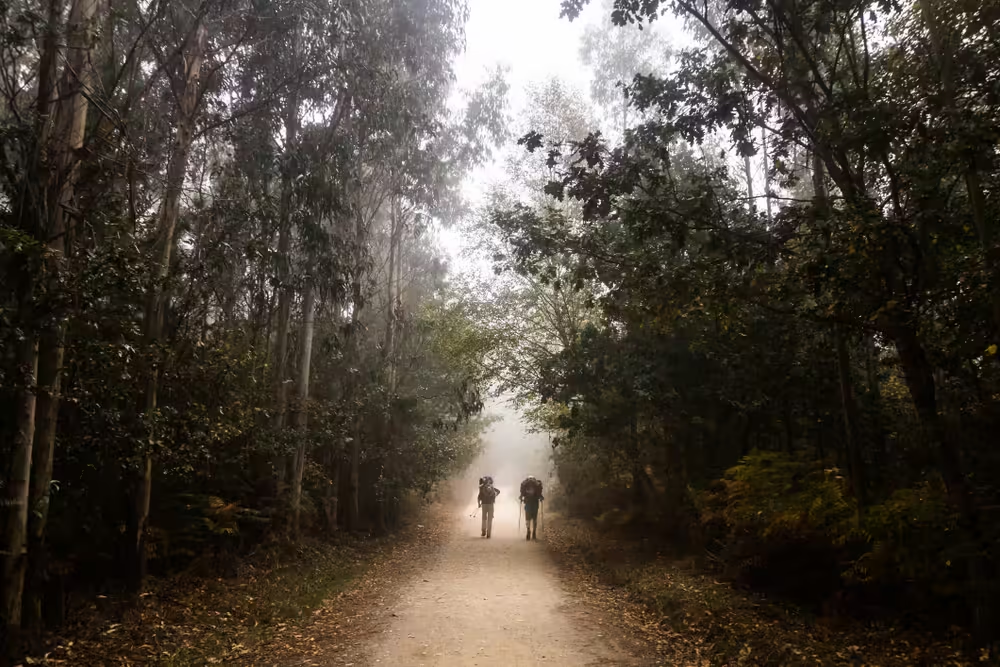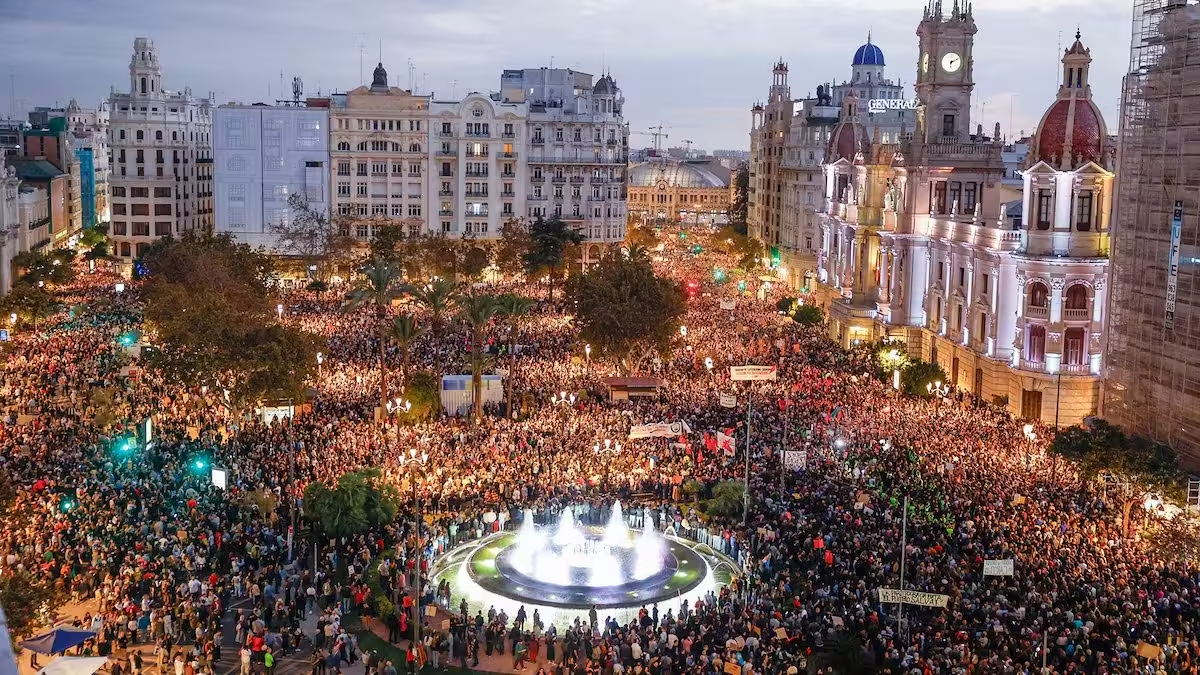Author Dermot Miller Talks ‘The Way’ and Life in Spain
In collaboration with Ybernia, we recently had the chance to catch up with Dermot Miller, an Irish writer living in Spain for almost 30 years. In this interview, Dermot shares how he fell in love with Madrid, what inspired him to write The Way, and how his life in Spain has shaped his storytelling. It’s a great conversation with someone who’s found a second home and a fresh perspective in a new country.
Dermot, you’ve been living in Spain for a long time now, haven’t you?
Yes that’s right. I came to Madrid in December of 1995, so I’ve been here for nearly 30 years. I studied French and Spanish at school and university, and I taught Modern Languages in Secondary Schools in London for about 14 years, but I found that London had become ridiculously expensive to live in, and that I was only just managing to pay a mortgage and the bills with very little left over for fun. I had already spent quite some time in different parts of France and Belgium during and after my studies, so I decided to move to Spain with the intention of spending a year or two here, just to see if I liked the lifestyle.
And you liked it?
Oh, yes. I fell completely in love with Madrid from the first moment. I had the strangest sensation that the city had been waiting just for me, and that I was immediately at home here. This is a phenomenon which I describe in more detail in my novel The Way. After a couple of years, I met my wife Mari-Paz here and, as the saying goes, the rest is geography … or is it biology? No, the rest is history, that’s the one!
Is The Way your first novel?
Yes, it’s my first full-length novel, but I started writing shortly after I came to Madrid. I compiled a short collection of poetry and prose which was published in London under the title of Immigrant To Iberia: An Irishman’s Odyssey, and this was a reflection of my initial impressions of living in Spain, as well as some recollections of the previous period in England.
So, what is your novel about?
Well, The Way is based on the famous ‘Way To Santiago’. The protagonist, an Irishman coincidentally also called Dermot, sets out to undertake the pilgrimage from the frontier with France in the central Pyrenees to eventually reach Finisterre in the province of Galicia. As he progresses on this journey, he describes the places that he passes through – the architecture, the traditions, the immense variety of local cuisine – but more importantly he focuses on the wealth of mysteries, myths and legends which make the walk so fascinating. However, the novel is much more than just a travelogue. It is also a gripping thriller since, as he follows ‘El Camino’, Dermot also recalls his experiences as a young man growing up in the midst of The Troubles in Northern Ireland. We learn how he becomes almost unwittingly involved in that conflict and how, after some very traumatic events, he escapes to Spain where he hopes to start a new life. Inevitably, his past catches up with him, and this heralds some dramatic consequences, and leads to an unexpected finale.
And what inspired you to write The Way?
There were several essential sources of inspiration which seemed to gradually converge in my mind when I first thought about creating a novel. Firstly, I had always had the vague intention of writing something about The Troubles since I myself lived through that time while I was at school, and it occurred to me that here in Spain most people have no idea what the conflict was all about, or how it all started. My daughter, Paula, was born here in Madrid and, although she has been to Ireland many times, I felt that it was very important for her to be aware of the origins and development of The Troubles (a situation which of course has not yet been fully resolved). I wanted it to be a kind of personal legacy, and to record for her my personal experiences of that terrible time.
The second major reason was the daily inspiration gained from just living here in Spain. For the past 30 years I have immersed myself in all aspects of Spanish culture – the history, the literature, the food, the regional variations of lore and language – and I still feel that I’m only just scratching the surface and have so much more to learn. I find that Madrid is particularly fascinating, and I never tire of wandering around the city while admiring the wonderful architecture or discovering intriguing new nooks and crannies that invariably reveal surprising histories. I think that this admiration for Spain is fully reflected in the novel, and I hope it adequately demonstrates my regard for its peoples. I wanted The Way to be my personal homage to the country and its inhabitants who have always made me feel at home.
I’m not sure exactly when, but I eventually hit on the idea of combining the two themes together by creating an Irish protagonist who could delve into the delights of ‘El Camino De Santiago’ and recount his impressions from the viewpoint of a ‘guiri’ (the Spanish term for a foreigner with slightly dismissive overtones). At the same time, he could provide a potted history of the tragic conflict in Ireland, related from a very personal view-point. A brilliant solution I think, even if I say so myself!
And have you walked The Way yourself?
In the book, Dermot spends a full month doing the entire walk from start to finish, but this is something which I personally have not done. My experiences of ‘El Camino’ have been built up over a long period of time in which I have walked many sections of the route for limited periods or explored the most important towns and villages during short visits. Much of the historical information and details of legends and miracles etc. have resulted from research on the spot or on Internet and through consultations with reference books, of which there is a plethora.
So why do you think so many people are attracted to El Camino de Santiago’
It is a phenomenon which has been increasing exponentially over the past decades, and now thousands of people of all nationalities are taking part in this pilgrimage all through each year. Perhaps The Way started to gain more international acclaim when the American actress, Shirley MacLean published the account of her own personal journey in 2001, ‘The Camino – A Pilgrimage of Courage’. And then in 2006, a South Korean writer, Kim Nam Hee, did the Camino and published in her country ‘The Journey of a Woman Alone’ which became a best seller, causing such a wave of interest that since then hundreds of her fellow Koreans flock to Spain to emulate that achievement. There have been many such travelogues written by authors from a wide range of nationalities, and I particularly liked Roads To Santiago (2014), by Cees Nooteboum from the Netherlands who incorporated lots of interesting and quirky anecdotes related to his trip.
One very unusual feature of your novel is what you refer to as ‘the soundtrack’. So what does that entail exactly?
Yes, that is something which is already appealing to readers. The origin of the idea was all down to my daughter, Paula, who introduced me to the Guardians of the Galaxy series of films, in which the captain of one of the spaceships is continuously tuned in to an antique Walkman, and this forms a wonderful sound-track for the movie with really great music from, I think, the 60’s, 70’s or 80’s. It occurred to me that if a film can have a soundtrack, why can’t a book have one too. So, the Dermot of the book, who is something of a manic obsessive, always has a song running through his head, even to the extent that he becomes very uneasy if he wakes up one morning with no song. This opened up the opportunity to make a reference to a particular piece of music in nearly every chapter of the novel, all of which coincide with the timescale of the events related in the book, and which fit in with the mood of the action. My editors very kindly created a playlist on Spotify that includes all of these songs, and this can be accessed by just doing a search for The Way on the Spotify platform.
OK, Dermot. So how can readers acquire a copy of the book if they were interested?
If you live in Madrid, it’s very simple. There are copies available on the shelves at the Secret Kingdoms and Desperate Literature bookshops in the capital. Alternatively, you can order directly from the publisher.
If Dermot’s story has piqued your interest, why not dive into The Way and join him on the Camino de Santiago? You can grab a copy at local Madrid bookstores or order it online. And while you’re at it, don’t forget to check out Ybernia’s website for more great reads and insights into life in Spain.
Explore their online book store: Click here
Main image: Shutterstock/gregorioa
Share this content:




4 comments